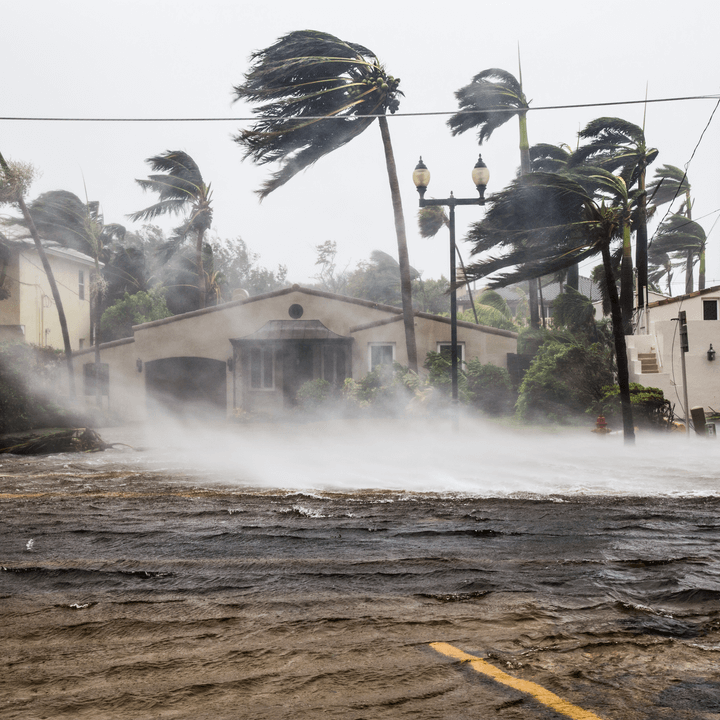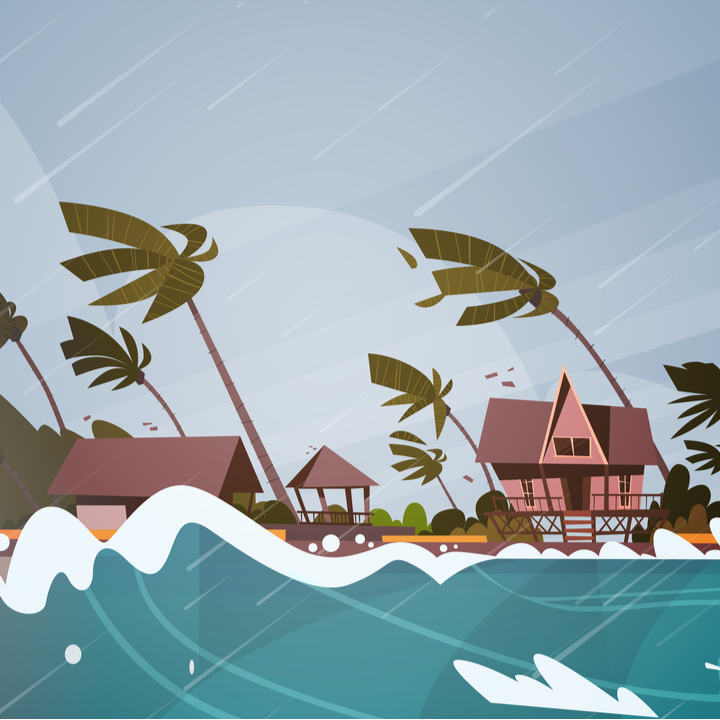
Hurricanes are serious storms of high winds and heavy rain that can be deadly and damage your homes and property. Hurricanes can reach wind speeds of more than 160mph and they can drop more than 2.4 trillion gallons of water a day, depending on their size.
The area of the United States most commonly affected by hurricanes is the east coast with a focus on the southeastern coast. A staggering 40 percent of all hurricanes that make landfall in the United States, hit Florida. If you live in an area at risk of damaging hurricanes, hurricane insurance coverage may be a good option for you to protect your home.
Does homeowners insurance cover hurricane damage?
In a hurricane, your home could be damaged as a result of strong winds and/or flooding. Your homeowners insurance covers damage to your home caused by certain perils. Typically, wind damage is one of the perils covered by homeowners insurance. However, whether or not you have wind coverage depends on your policy. Some homeowners insurance companies exclude wind coverage or cover it partially, especially if you live in a coastal area.
If wind coverage is included on your homeowners insurance policy, you may have a separate hurricane deductible, which is likely higher than your regular homeowners insurance deductible. Your hurricane deductible may be a percentage deductible, rather than a fixed dollar amount. A percentage deductible will be the amount of the percentage of your home’s insured value. Percentage deductibles typically range from one to five percent of the value of your home that’s insured.
For example, if the insured value of your home is $200,000 and your hurricane percentage deductible is two percent, you’re deductible will be $4,000. You’ll need to pay $4,000 of your hurricane damage and your insurance will cover the rest, up to your policy's limit.
There are 19 states plus Washington, D.C. that allow insurance companies to require special hurricane deductibles that differ from your homeowners insurance deductible. Those states are:
- Alabama
- Connecticut
- Delaware
- Florida
- Georgia
- Hawaii
- Louisiana
- Maine
- Maryland
- Massachusetts
- Mississippi
- New Jersey
- New York
- North Carolina
- Pennsylvania
- Rhode Island
- South Carolina
- Texas
- Virginia
- Washington, D.C.
Check with your state’s specific hurricane insurance regulations by visiting your state’s insurance department website.
In addition to that, your wind damage would be covered only up until your policy limits. If wind damage is covered by your homeowners insurance policy, you’d be covered for damage caused by wind. For example, if a tree falls on your home because of the wind, you would be covered.
In terms of coverage for flooding, homeowners insurance doesn’t cover flooding caused by natural disasters. It only covers water damage in your home if it was caused by something sudden and accidental, such as an appliance malfunction in your home. In order to get flood coverage, you need a separate flood insurance policy.
Say the tree fell on your home, damaged your roof and rain water got into your home damaging items inside. In this case, your homeowners insurance may provide some coverage, but not always. You’d be best off having flood insurance as well.
Be sure to check your homeowners insurance policy to find out exactly what hurricane coverage your policy has.
Hurricane insurance coverage: What does hurricane insurance cover?
If you live in a coastal area that has a high chance of experiencing hurricanes or even other severe storms that can cause wind and flood damage, you may want to consider hurricane insurance options. There are two options of hurricane coverage you can purchase: flood insurance and windstorm insurance.
Flood insurance
Flood insurance offers you protection for your home and personal items from damaging floodwaters. Weather-relating flooding is not covered by your homeowners insurance policy, so flood insurance is necessary for flood protection. There are two types of flood insurance policies offered: building property coverage and personal property coverage. You can purchase one or both of these when you buy flood insurance. What each type of coverage covers is listed below.
Building property coverage
- The insured building and foundation
- Electrical and plumbing systems
- Central air-conditioning equipment, furnaces and water heaters
- Appliances such as refrigerators, cooking stoves and built-in appliances, including dishwashers
- Permanently installed carpeting
- Permanently installed paneling and wallboards, bookcases and cabinets
- Window blinds
- Detached garage up to 10 percent of the coverage (detached buildings other than a garage need a separate building property policy)
- Debris removal
Personal property coverage
- Personal belongings (including furniture, clothing and equipment)
- Curtains
- Portable and window air conditioners
- Portable microwave ovens
- Portable dishwashers
- Carpets not otherwise included in the building property coverage
- Clothes washers and dryers
- Freezers and the food in them
- Valuables up to $2,500
Flood insurance only protects your home. If your car is damaged by a flood in a hurricane, flood insurance will not cover it. You’ll need to seek out your comprehensive coverage on your car insurance policy.
You can learn more about flood insurance in our Flood Insurance Guide.

Windstorm insurance
If you live in an area commonly affected by hurricanes and strong storms, windstorm insurance is another option, in addition to flood insurance, that you can purchase to protect your home. While wind coverage is typically included on a regular homeowners insurance policy, if you live in a coastal area, it may be excluded from your policy. Additionally, your basic policy may cover wind damage from a strong tropical storm, but if it reaches hurricane status, you may not be covered. Windstorm coverage may be a rider on your homeowners insurance policy.
Windstorm insurance covers damage to your home and personal property caused by wind and hail from hurricanes and other storms like tornadoes. Windstorm insurance coverage can be useful to people who live in coastal areas where hurricanes frequently hit but also people in the midwestern states where tornadoes commonly occur.
With windstorm insurance, your home and personal items in the home will be covered from damage caused by wind. If you have a detached garage, you may also be able to get windstorm insurance coverage for that. High winds in a hurricane can cause damage to your windows and roof. If it does and water and other debris gets into your home, your items will likely be covered. Windstorm insurance also typically covers debris removal.
Windstorm insurance does not offer flooding coverage, though. Flooding may follow a windstorm because of a hurricane or a storm surge, but windstorm insurance won’t cover the damage for that. You need flood insurance to be covered.
Additionally, much like flood insurance, windstorm insurance will not cover damage to your car. If you have comprehensive insurance coverage on your car insurance policy, that may cover damage to your car.
Do I need hurricane insurance?
When deciding if you need hurricane insurance, you need to evaluate the risk of your home. If you live in a coastal state that experiences hurricanes and tropical storms often, hurricane insurance coverage is something to consider. Just one inch of water in your home can cause $25,000 in damage.
When determining your risk of flooding, it’s important to note that all 50 states have experienced flooding in the past 5 years. FEMA identified flood zones for all areas of the United States. You can see your flood risk by using the FEMA Flood Map Service Center. If you live in or near a high-risk flood zone, you should strongly consider buying flood insurance.
However, the NFIP reports that 20 percent of flood claims happen to properties that aren’t located in a high-risk area. When Hurricane Florence hit the Carolinas in 2018, it caused an estimated loss of between $2 billion and $5.5 billion, excluding National Flood Insurance Program losses. The scary statistics of Hurricane Florence are that more than 90 percent of homeowners in the Carolinas didn’t have flood insurance. This resulted in devastating financial losses for many homeowners who experienced hurricane damage.
When determining if you need windstorm insurance, first check with your homeowners insurance policy to see if wind damage is covered in hurricane situations. If it isn’t, consider adding additional windstorm coverage to your homeowners insurance policy.
How to get hurricane insurance
The majority of flood insurance policies are provided through the National Flood Insurance Program (NFIP), a federal program created by Congress and managed by the Federal Emergency Management Agency (FEMA). There are also some private insurance companies that sell it. Typically, you can get coverage through the NFIP as long as your community participates in the program. If it doesn’t, you may need to get a policy through a private insurer.
Windstorm insurance is typically in the form of a rider on your homeowners insurance policy. If you need windstorm insurance, contact your insurance company to discuss your options.
If you’re unable to get coverage for food or windstorm insurance because of the high risk of you and/or your home, most states offer FAIR plans (Fair Access to Insurance Requirements). FAIR plans are state-mandated and are made for homeowners who are unable to get insurance on the private market because of their high risk. FAIR plans make insurance available to everyone. To check if your state offers FAIR plans, check this page by the Insurance Information Institute.
In addition to FAIR plans, there are a handful of Atlantic and Gulf states that have Beach and Windstorm Plans. If you’re unable to get hurricane coverage, you may be able to get one of these plans.
How to file a hurricane insurance claim
If you have hurricane insurance and you experience a damaging hurricane and need to file a claim, make sure you do so ASAP. Hurricanes usually affect a large area, so be aware that it may take a long time in order for your claim to be processed. You don’t want to wait to file a claim because it could affect if your damage is covered by your insurer or not. Additionally, filing the claim as soon as possible minimizes the length of time you’ll need to wait before an adjuster can assess your damage.
Whether you experience flooding, wind damage or both, it’s important to take note of all the damage and take photos for evidence. In the case of a flood, take photos of the waterline. Make a list of everything that was damaged or lost by the hurricane. Make sure to move any items in your house that could be damaged further in order to save them.
To file the claim, you need to contact your agent or insurance company. For wind damage, you likely need to contact your homeowners insurance company as long as your windstorm insurance coverage is a rider on your homeowners insurance company.
After you’ve filed the claim, you can begin to search for documentation of the purchase of your items, such as receipts and invoices. These proof of purchase documents can help support your claim.
How much does hurricane insurance cost?
The cost of hurricane insurance varies based on a number of factors. If you’re purchasing flood insurance, FEMA reports that the average cost of flood insurance is about $700 per year, but it could be much less if you live in an area with a low flood risk.
The cost of flood insurance can vary based on the following factors:
- Flood risk (your flood zone)
- Your deductible
- Your coverage
- Age of your building
- Building occupancy
- Number of floors
- Location of the lowest floor in your building in relation to the base flood elevation on the flood map
The cost of windstorm insurance for hurricane coverage largely depends on your area. It also depends on what your deductible is and how much it would cost you to rebuild your home. Your windstorm insurance deductible can vary based on your state.
How to prepare for a hurricane
Unlike tornadoes, hurricanes are pretty predictable storms that allow you more time to prepare. However, as soon as you hear of an impending storm coming to your area, you should begin preparations. If you’re required to evacuate, you’ll need to do so very quickly, and it can save you time and stress if you’re prepared ahead of time.
Prepare your home for a hurricane
Before hurricane season even arrives, you should ensure your home is protected with the proper insurance coverage. You can purchase flood and/or windstorm insurance to protect your home from the damaging storms. If you choose to purchase hurricane insurance, be sure to do so well in advance. There is a waiting period for flood insurance of usually about 30 days. During the waiting period, you will not have flood insurance protection until the period has ended. Flood insurance is not something you can purchase and use right as a storm is approaching.
There are other ways you should prepare your home to try to protect it from hurricane damage.
- Make sure your drains and gutters are clear. This can help prevent flooding or to prevent flooding from getting worse.
- If you have anything outside, such as outdoor furniture, move the furniture indoors. Anything you leave outside could become very dangerous if the wind picks them up and carries them. If you have items that aren’t safe to take inside like propane tanks, make sure they are anchored down.
- If you have trees in your yard, check them for any loose branches. If you can, remove any loose or low-hanging branches to avoid them falling on your home.
- Board your windows up to prevent them from breaking. Storm shutters are the best option to board up windows but if you don’t have those, you can use plywood. FEMA recommends using ⅝” exterior grade or marine plywood.
Prepare your family for a hurricane
The best thing you can do before a hurricane is to prepare yourself. Your safety should be your top priority. If you’re required to evacualte, you’ll likely need to do so quickly so it’s important to be prepared to evacuate. Prepare yourself and your family with the following steps.
- Make an emergency disaster kit filled with necessary items. The kit may include water, non-perishable food, a first-aid kit, medications, pet needs, flashlight and extra batteries, radio and important documents. An emergency disaster kit can come in handy during a hurricane, even if you don’t need to evacuate.
- Make an emergency evacuation plan with your family. Before the hurricane hits, create a plan on what your family will do in an emergency evacuation situation. Make sure all family members know the plan and know what they need to do if you’re required to evacuate. If you have pets, make sure to include them and their needs into the plan. Make sure you know where you’ll be evacuating to and make proper arrangements.
- Make a communication plan with your family in case you get separated that includes a meeting spot. It’s also important to note that texting is often more reliable than making phone calls in an emergency situation because the phone lines often get clogged from so many people trying to make calls.
- Make sure your car is ready to go. Have a full tank of gas and make sure the car is in good working condition. You may need to sit in traffic or drive a far distance to evacuate. Additionally, you should pack extra changes of clothes and other items in the car ahead of time to save time if you need to evacuate.
If you’re anticipating a hurricane, make sure to continually check local weather for the latest warnings and instructions. You should check at least every half hour once you are 8 hours away from the hurricane reaching your area. Make sure all your cell phones are charged and you have a radio handy to keep in touch with weather updates if you lose power.
If you live in a hurricane-prone area, being prepared is the best thing you can do. Make sure you evaluate your insurance needs well in advance before a storm is even on the radar. If you’re looking for a homensurance company, see which companies other homeowners rate as the top homeowners insurance companies.
The content on this site is offered only as a public service to the web community and does not constitute solicitation or provision of legal advice. This site should not be used as a substitute for obtaining legal advice from an insurance company or an attorney licensed or authorized to practice in your jurisdiction. You should always consult a suitably qualified attorney regarding any specific legal problem or matter. The comments and opinions expressed on this site are of the individual author and may not reflect the opinions of the insurance company or any individual attorney.







